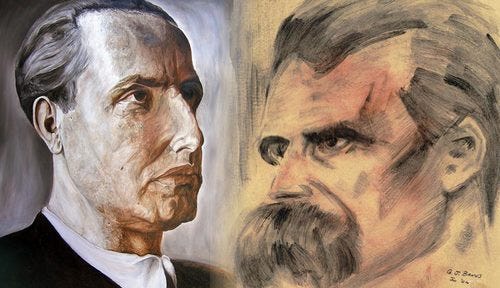Evola Stares into the Abyss
JULIUS Evola (1898-1974) was one of the few philosophers who was able to recognise that, by unleashing the doctrine of the unfettered Übermensch, Friedrich Nietzsche (1844-1900) had progressed beyond notions of good and evil merely to erect a new set of values in their place. Indeed, comparing the role of Nietzsche's hypothetical Superman to that which he regarded as the fruitless Marxist quest for an unattainable utopia, Evola tells us that the similarity lies in the fact that a
"mirage of a future human condition after the worldwide revolution serves to give meaning to everything inflicted on the man of today in the areas controlled by this ideology. This is a flagrant contradiction of the demands of a life that is its own meaning."
Whilst Nietzsche is commonly regarded as a nihilist, therefore, Evola suggests that for the true purveyor of meaningless even the Übermensch himself is not safe from the rejection of moral and religious principles. For the amoralist, then, everything becomes fair game and surely the rejection of one 'good' must presuppose the fragility and vulnerability of another?
Evola is rather less critical of Nietzsche's belief in the Eternal Recurrence, believing that it
"is the affirmation, now truly unconditional, of all that is and of all that one is, of one's own nature and one's own situation. It is the attitude of one whose self-affirmation and self-identity come from the very roots of his being; who is not scared but exalted by the prospect that for an indefinite repetition of cosmic cycles he has been what he is, and will be again, innumerable times."
In other words, it is precisely here that Nietzsche's passionate celebration of the imperishable mythos aligns itself with the world of Tradition. Again and again and again.



